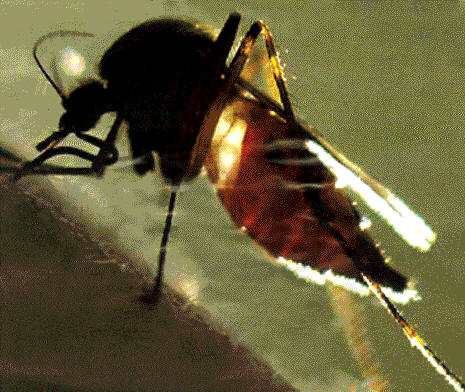Fighting dengue with family planning for mosquitoes
The scourge of dengue fever might be cut by neutering the mosquitoes
that carry it. Call it family planning. Males are genetically engineered
so that when they mate with females, their offspring never surpass the
larval stage of development.
While the idea is nothing new, it is the first time such an approach
is being used to develop male-sterile Aedes aegypti, the type of
mosquito that carries yellow fever, chikungunya and dengue fever.
|

Dengue mosquito |
The World Health Organizations (WHO) estimates that approximately
two-fifths of the world's population - 2.5 billion people - are now at
risk from the dengue virus, primarily in South Asia and Latin America.
But recent reports show that the tropical disease has increased
30-fold over the past 50 years, especially as temperatures warm in
typically cool regions, such as in North America.
In an attempt to address what is already an endemic in some parts of
the world, a team of researchers at Oxitec, based in Oxford, the United
Kingdom, has created a Genetically Modified (GM) A. aegypti mosquito
designed to compete with wild-type mosquitoes. If all goes well, the GM
version will eventually lead to a reduction in dengue-carrying
mosquitoes.
Controlled testing has already begun in Malaysia and, pending
regulatory approval, authorities are expected to release the organisms
into the wild.
But not everyone is buzzing with excitement. A concerned group of
citizens in the South Asian country fear they are being subjected to an
experiment where all the risks are not immediately apparent.
The first open-field testing of GM mosquitoes has many fearing that
Oxitec and the Malaysian Government will lose control over its creation,
creating a Frankenstein-mosquito.
Oxitec's head of business development Ann Kramer told Xinhua in a
recent interview by phone that, unlike other GM mosquitoes being
developed by academic groups, Oxitec's mosquito will be unable to spread
its genetically altered traits throughout the environment.
"With our approach, they will be released, they will die, and their
progeny will die so there will always be the ability to take it at a
speed we control," she said from her office in Oxford. "We can decide,
rather than run the risk of things going faster than we had perhaps
planned."
The Sterile Insect Technique (SIT) that Oxitec employs has been
around for decades. In the United States and Mexico, authorities used
the method to eliminate the New World screw-worm by about 1985. And in
China, there could be future possibilities for the technique. Kramer
said the Ministry of Agriculture has contacted Oxitec about using their
approach to combat the Oriental fruit fly, which is threatening China's
citrus agriculture. But up until recently, the SIT seemed doomed to fail
in A. aegypti mosquitoes because, in part, the radiation for
sterilization is extremely damaging. To address the issue, Oxitec has
developed a sterile male version which does not need to be irradiated
and produces late-acting lethality in its larvae.
"In the past, that has not been possible," said Kramer, noting that
the Indian Government has also begun testing the Oxitec technology in
labs in Chennai.
A New York-based nonprofit environmental group reported that two
types of mosquitoes capable of transmitting the virus - the
predominantly urban species A.aegypti and the Asian tiger mosquito -
have been found in 28 U.S. states and may travel further around the
country as temperatures rise. Climate change could push the
traditionally tropical disease into the far corners of the United
States, where dengue-carrying mosquitoes have typically been rare.
According to the WHO, cases of dengue have reached unusually high
rates in the past four years, with 50 million infections worldwide every
year.
Sometimes, dengue infections lead to hemorrhagic fever, a potentially
lethal complication that has become a leading cause of hospitalization
and death among children in Asia, according to the WHO.
Marked by the severe onset of a fever of 103 to 105F, or around 40C,
victims suffer from pain behind the eyes, muscle and joint pains, skin
rash, diarrhea and vomiting. With no cure or vaccine in sight, the WHO
has stated that the only way to prevent virus transmission is to attack
the mosquitoes themselves.
Researchers are primarily interested in whether the GM mosquito is
able to compete with local males to win the female over and impregnate
her with the never-to-be-born offspring.
Currently, the Malaysian Government spends 130 million U.S. dollars a
year on trying to control mosquitoes and on tending to those infected
with the dengue virus, according to Kramer, who cited a report to be
released shortly.
Going after A. aegypti is the best approach to a quickly- spreading
disease, said Kramer. Insecticides only kill the mosquitoes present at
that very moment and many people do not want insecticide sprayed in
their homes.
United Nations, Xinhua |



